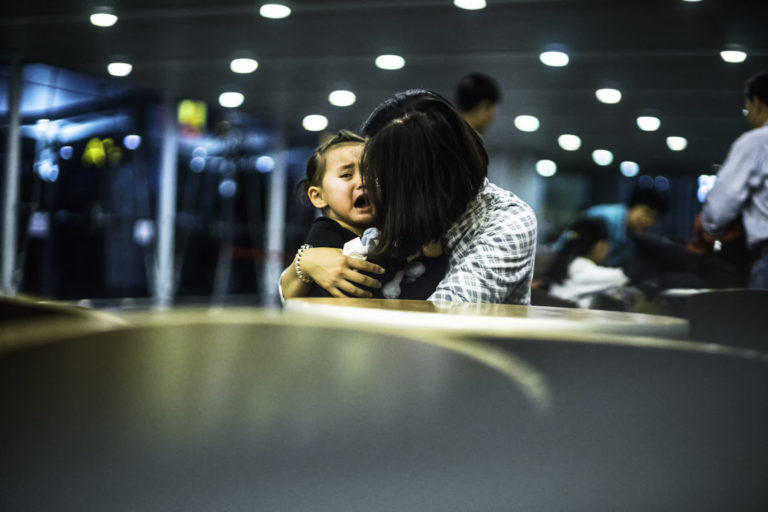
Image by Leo Hidalgo/Flickr, Attribution-NonCommercial.
The Power of a Crew
We love the mythology of the lonely genius. There’s something romantic, if a little unhinged, about the totally enraptured artist, alone for hours in the studio throwing paint against a canvas. Perhaps it’s our real lives, filled with mundane details and the complication of caretaking, that makes us so seduced by the idea that the best writing and music and art comes out of uninterrupted solitude, the losing track of time, the blocking out of other voices.
But that’s just not how the creative process works for most of us. For most of us, good art is the direct result of good friends.
I experienced the power of the crew firsthand in my own career. In my early 20s, I started a writers group. I looked around and realized that I had about a dozen friends who were all trying to make it as writers in various genres, and that all of us were hungry for feedback and not about to dish out tens of thousands of dollars to get it via graduate school — at least at that time.
The structure evolved over time and proved very effective: we met every other week on Tuesday nights at someone’s cramped Brooklyn apartment. Two people would send work — everything from long-form journalism to poetry to crime fiction — ahead of time. We would socialize for a little bit, but pretty quickly get down to business, starting with a check-in when everyone would say a few words about what they were working on, how they were feeling, etc.
Then the people receiving feedback (also charged with bringing wine or beer, because, duh) would give a bit more context about the piece they had submitted and what their mental state was with regard to it (as in, “Rip it to shreds, I know it’s early days and I want as fierce a critique as possible,” or, equally valid, “I’m feeling really sensitive about this one, put your kid gloves on”). Those of us giving feedback would start with what we genuinely loved and work our way towards what we didn’t think was working, based on what the author had set as her intention. The author was asked to stay pretty quiet until we’d given a critical mass of feedback; we noticed that, for some of us, it was easy to get defensive or fritter away time explaining when really the feedback was the most valuable use of time. Then she could ask as many questions as she wanted.
All those Tuesday nights. All those wine stains atop coffee tables salvaged from the unceasingly prolific streets of Park Slope. All those slices of ridiculously good New York pizza. All that throat-clearing preceding a friend trying to say something hard and necessary. All those pages on top of pages on top of pages. And yes, all those tears.
What it added up to was this: We took each other seriously before the rest of the world did.

It mattered. It changed all of our lives in ways externally measurable — book deals, job offers, even TV shows — and internally immeasurable — we processed loss of epic proportions, we made each other feel less alone in a notoriously lonely city at a notoriously lonely stage of life, we kept sitting our butts in chairs and doing the dang thing.
Part of why it worked was the structure. We were unapologetically earnest about why we were there and stuck to it. Despite all the hand wringing about narcissistic millennials who want to get big praise for little work, we were sweating hard in pursuit of our creative dreams. We knew that our writing was only going to get better if we did a lot of it and got critical, compassionate feedback along the way. It helped that we felt responsible to the crew. Before fancy editors were waiting on our emails, much less knew our names, our friends were going to be irritated if we signed up to present and then didn’t send any work. One of our members, Kimmi Auerbach Berlin, sums it up, “If it had just been a group of talented people, but they had all been dicks, it wouldn’t have helped, even if the feedback was killer. And if everyone had just been kind and not talented, it wouldn’t have pushed me to the next level in my writing.”
Part of why it worked was that, though we shared a passion for writing, we all channeled it into different genres so there wasn’t a whole lot of direct competition. For those of us who technically were in direct competition, we rejected that paradigm and adopted a “rising tide” mentality instead. Kate Torgovnick May, another group member, explains: “With the group, if one of us made an editor contact, all of us had an editor contact. If one of us made an agent contact, all of us had that agent contact.”
Part of why it worked is that we were vulnerable and talked about the unsexy stuff: the frustrating exchanges with editors, the even more frustrating experience of never hearing back from editors, the projects that died on the vine. We helped one another create financial sustainability in our lives, even while working as artists, because we didn’t shy away from getting real about the side hustles (largely, by the way, in tutoring rich kids to take standardized tests. I swear that if the SATs are ever abolished, we will have a more equal, less anxious nation, but people in their 20s will stop making art).
“One of the most important things for me was just seeing everyone’s process — seeing how much work it takes to sell something, but also that it is possible,” another member, Joie Jager-Hyman, explains. “It helped expose me to the necessary (and sometimes evil) process of taking work into a public forum, which is a crucial hurdle that many people fail to overcome.”
But mostly why it worked was that we were real friends. We hung out before and after group. We weathered heartbreak and death together. Sometimes we fought. We made up. We celebrated. We saw one another not just as sources of feedback on the words we wrote, but also as sources of feedback on the people we were becoming. We wanted to grow up to be people we liked and we helped one another do that by holding up a million tiny mirrors. As Jennifer Gandin Le, another group member put it, “We were all bad-ass goofballs with big hearts and dreams who were willing to listen.”
As our 20s wore on, our schedules got more complicated and it got harder and harder to meet every other week. Then it got harder and harder to meet once a month. Then the mass exodus from New York took place.
We have a growing herd of babies and books these days. We live in Bozeman and Minneapolis and Austin and Amherst and, yes, still New York, and all over. We still get together in various configurations and sometimes even give feedback like the old days via Google hangouts or old-fashioned phone calls. But the group lives on because we knew one another so well that we’ve internalized the various voices that once filled those sometimes terrifying, always edifying Tuesday nights.
Ethan Todras-Whitehill, one of the founding members, wrote recently in an email chain exchanged between the members: “Essentially, I internalized all of your perspectives into my own editing. Even yesterday, while I was editing a story for the umpteenth time out on my deck looking at the pond, a little piece of me was saying, ‘What would Kate say about this line? What would Kimmi say about the character’s want and obstacle? What would Courtney say about his soul?’ You guys helped me become my own writers group.”
If the best possible work reflects something fundamental about who you are, then the best possible collaborators are those who help you see if that’s happening more accurately — one loving, fierce critique at a time. We were invested. We showed up, over and over again. We listened even when it was hard. Spoke even when it was hard. And shut up even when it was hard. In aggregate, it felt like unconditional love.



Share your reflection